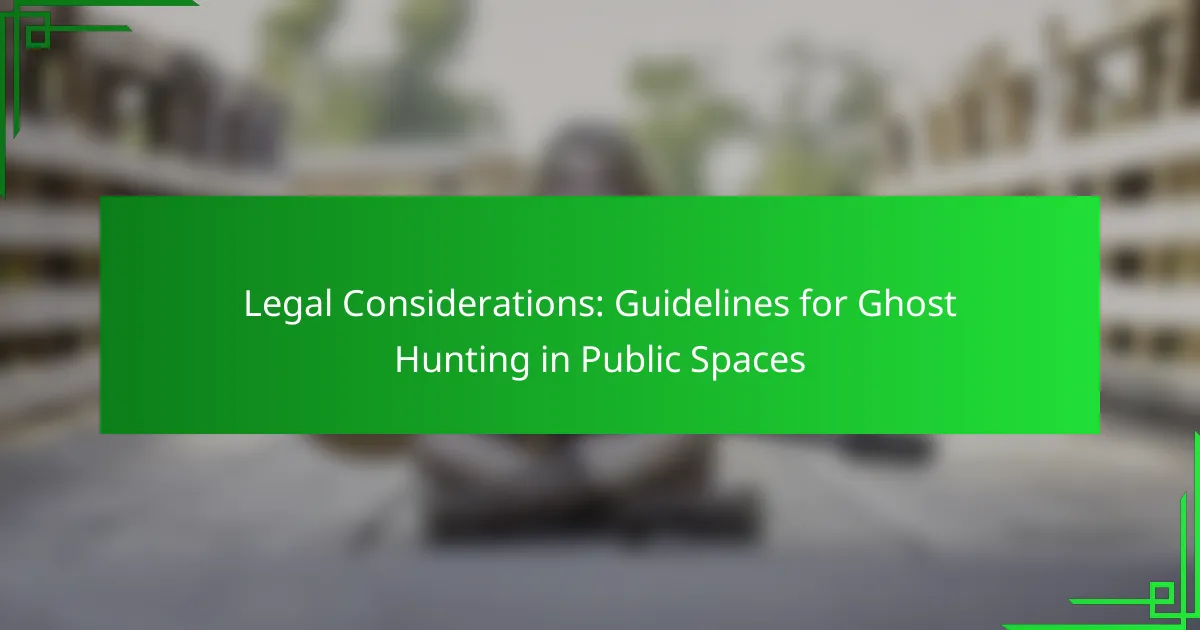Engaging in ghost hunting within public spaces necessitates a thorough understanding of legal considerations, including the need for permits and compliance with local regulations. It is essential to communicate with local authorities and property owners to secure the necessary permissions, ensuring that investigations are conducted lawfully and respectfully. By adhering to these guidelines, ghost hunters can avoid legal complications while fostering a safe environment for all involved.
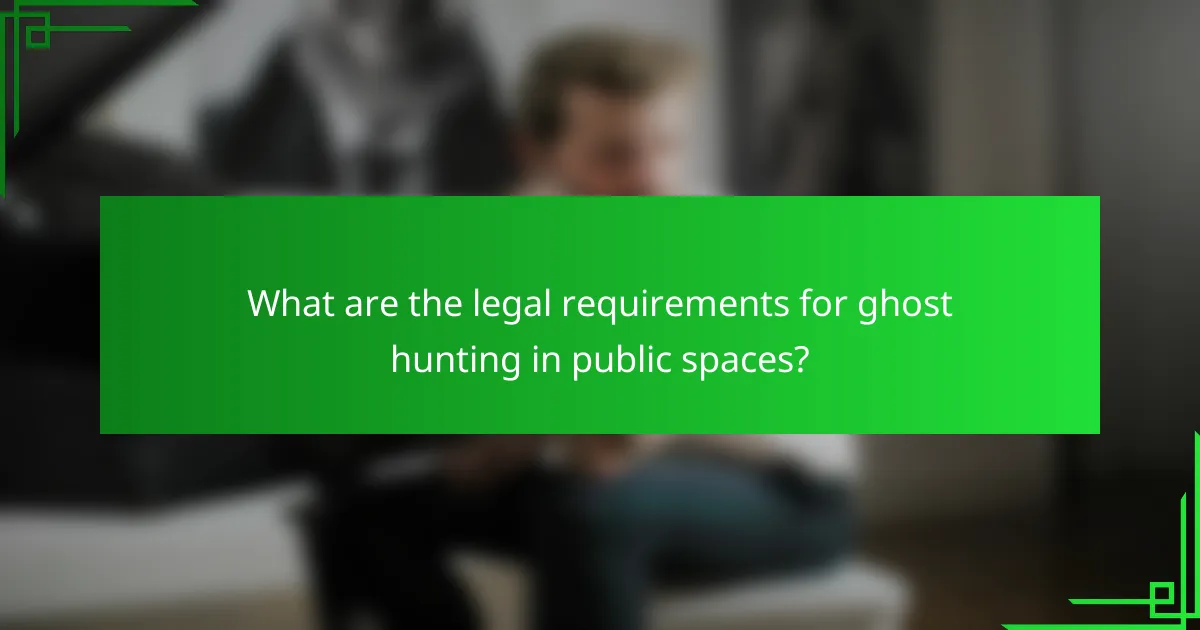
What are the legal requirements for ghost hunting in public spaces?
Ghost hunting in public spaces often requires adherence to specific legal requirements, including obtaining necessary permits and complying with local laws. Understanding these regulations is crucial to avoid potential legal issues while conducting investigations.
Permits and permissions
Before engaging in ghost hunting activities in public spaces, it is essential to secure the appropriate permits and permissions from local authorities. This may involve submitting applications to city or municipal offices, especially if the location is a historical site or protected area.
Some locations may have specific guidelines regarding the number of participants, time restrictions, or equipment usage. Always check with local authorities to ensure compliance and avoid fines or legal repercussions.
Local regulations
Local regulations can vary significantly depending on the jurisdiction. Some areas may have strict rules governing nighttime activities, noise levels, or the use of certain equipment like cameras or audio recorders. Familiarize yourself with these regulations to ensure your ghost hunting activities are lawful.
Consult local government websites or contact local law enforcement for detailed information on regulations that may apply to your chosen location. This proactive approach can help you avoid misunderstandings and potential conflicts.
Liability waivers
When conducting ghost hunts in public spaces, consider having participants sign liability waivers. These waivers can protect you from legal claims related to accidents or injuries that may occur during the investigation.
Consult with a legal professional to draft a waiver that clearly outlines the risks involved and the responsibilities of participants. This step can provide an extra layer of protection for both you and your team.
Insurance considerations
Obtaining liability insurance is a prudent step for ghost hunting groups operating in public spaces. This insurance can cover potential claims arising from accidents or property damage during your activities.
Evaluate different insurance policies to find one that suits your needs, considering factors such as coverage limits and premiums. Investing in insurance can provide peace of mind and financial protection while pursuing your ghost hunting interests.
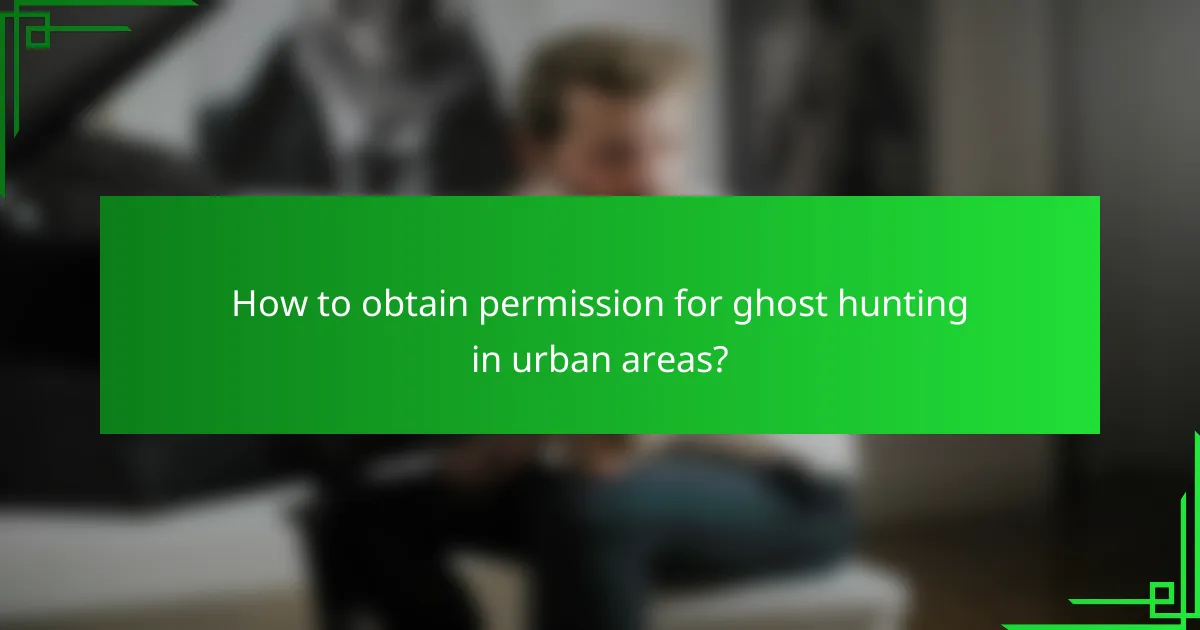
How to obtain permission for ghost hunting in urban areas?
To obtain permission for ghost hunting in urban areas, you need to engage with local authorities and understand the regulations regarding public and private properties. This process typically involves contacting relevant officials and submitting formal requests to ensure compliance with local laws.
Contacting local authorities
Start by identifying the appropriate local authorities, such as city councils or municipal offices, that oversee public spaces. Reach out to them via phone or email to inquire about the specific requirements for ghost hunting in your area.
Be prepared to explain your intentions clearly, as some authorities may have concerns about safety, noise, or public disturbance. Establishing a good rapport can facilitate the process of obtaining permission.
Submitting formal requests
Once you have gathered the necessary information, submit a formal request for permission to conduct ghost hunting activities. This request should include details about the location, date, time, and purpose of your investigation.
Ensure that your request is concise and addresses any potential concerns from local authorities. It may be helpful to provide a plan outlining safety measures and how you will minimize disruption to the public.
Understanding public vs. private property
Before planning your ghost hunting expedition, it’s crucial to distinguish between public and private properties. Public spaces, such as parks or historical sites, generally require permission from local authorities, while private properties need consent from the property owner.
Always verify the ownership status of your intended location. Trespassing on private property can lead to legal consequences, so obtaining explicit permission is essential for a successful ghost hunting experience.
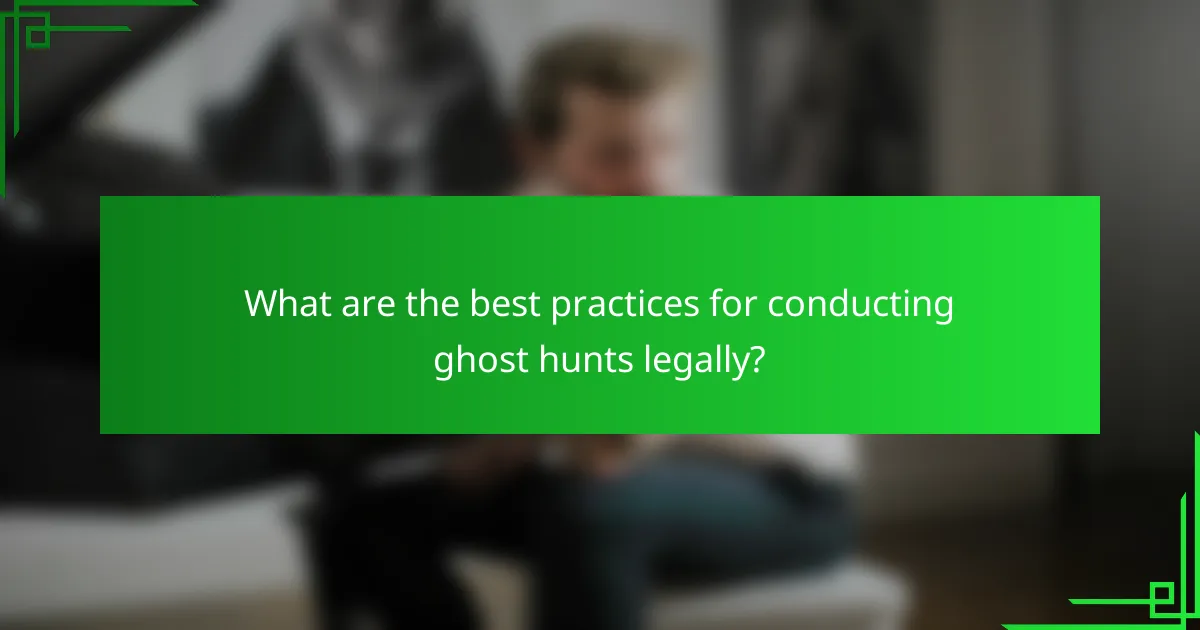
What are the best practices for conducting ghost hunts legally?
To conduct ghost hunts legally, it is essential to obtain permission from property owners, adhere to local laws, and respect the rights of others. Following these best practices helps ensure a safe and respectful experience for both investigators and the public.
Respecting property rights
Always seek explicit permission from property owners before conducting any ghost hunting activities. Trespassing can lead to legal consequences, including fines or arrest. If you are unsure about the ownership of a location, research local property records or contact local authorities for guidance.
When granted permission, clarify the terms of your visit. Discuss any restrictions, such as areas that are off-limits or specific times when access is allowed. This transparency fosters goodwill and can lead to future opportunities.
Following ethical guidelines
Adhering to ethical guidelines is crucial in ghost hunting. This includes treating locations with respect, avoiding damage to property, and not disturbing the peace of nearby residents. Always conduct your activities quietly and responsibly, especially in residential areas.
Additionally, consider the emotional and historical significance of the locations you investigate. Engaging with the local community and understanding their perspectives can enhance your experience and promote positive relationships.
Documenting interactions
Keep thorough records of your ghost hunting activities, including dates, locations, and any interactions with property owners or the public. This documentation can be valuable for legal protection and for sharing your findings with others.
Use a consistent format for your notes, and consider including photographs or audio recordings to support your observations. This practice not only helps in maintaining transparency but also contributes to the credibility of your investigations.
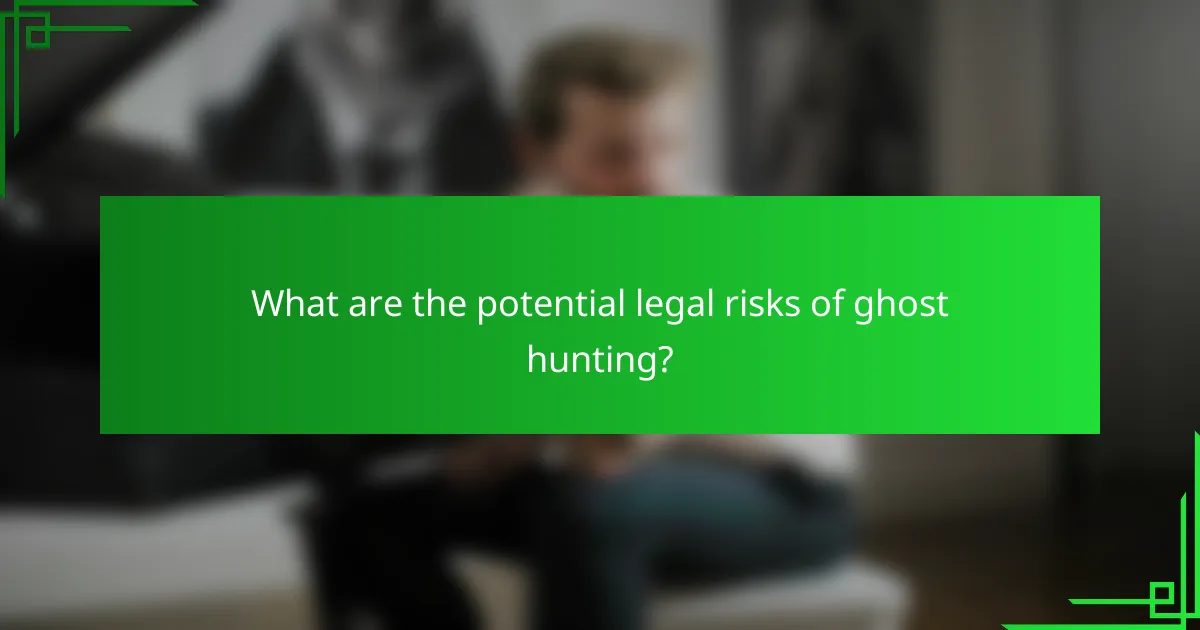
What are the potential legal risks of ghost hunting?
Ghost hunting in public spaces can expose individuals to various legal risks, including trespassing, disturbing the peace, and liability for damages. Understanding these risks is crucial for anyone considering paranormal investigations in shared environments.
Trespassing charges
Trespassing occurs when individuals enter a property without permission. Ghost hunters must ensure they have explicit consent from property owners or managers before conducting investigations to avoid legal repercussions.
Even in public spaces, there may be restrictions on certain areas, especially if they are marked as off-limits. Always check local laws and regulations regarding access to specific locations.
Disturbing the peace
Disturbing the peace refers to actions that disrupt the tranquility of a community. Ghost hunting activities, such as loud noises or the use of equipment, can lead to complaints from nearby residents or businesses.
To mitigate this risk, keep noise levels low and be respectful of the surrounding environment. It may also be beneficial to conduct investigations during hours that are less likely to disturb others.
Liability for damages
Liability for damages can arise if ghost hunting activities inadvertently cause harm to property or individuals. This includes damage to structures, landscaping, or personal belongings during an investigation.
To protect against potential liability, consider obtaining liability insurance and always conduct a thorough assessment of the area before beginning any activities. Documenting the condition of the property beforehand can also be helpful in case of disputes.
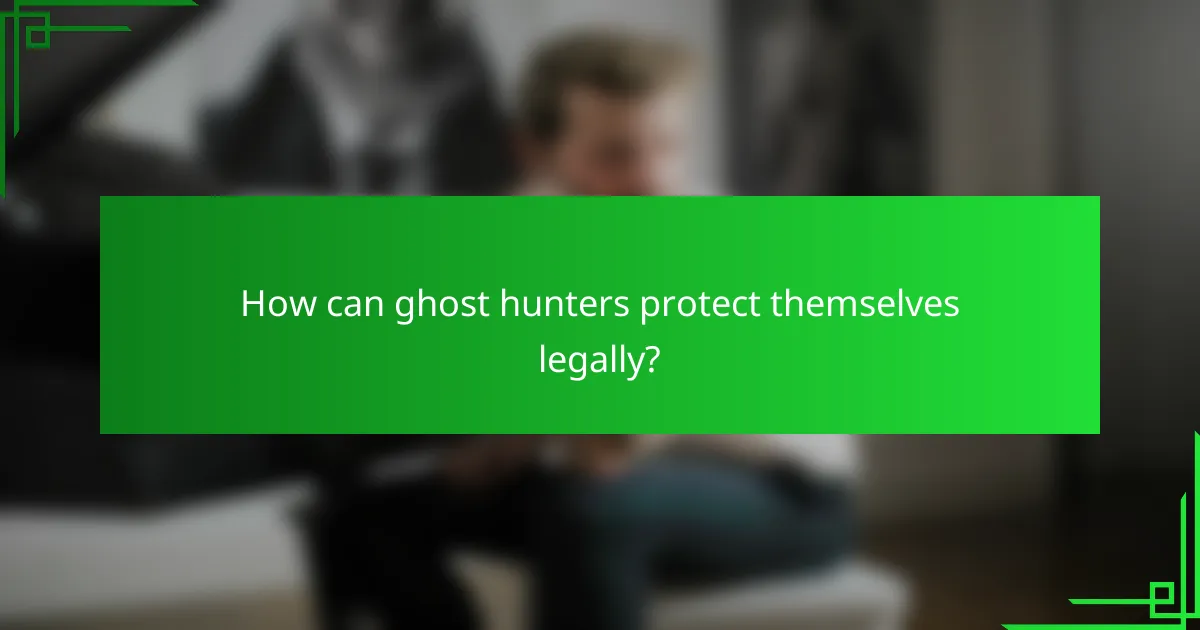
How can ghost hunters protect themselves legally?
Ghost hunters can protect themselves legally by understanding the importance of contracts, obtaining appropriate insurance, and establishing safety protocols. These measures help mitigate risks associated with ghost hunting in public spaces and ensure compliance with local laws.
Using contracts
Contracts are essential for ghost hunters to clarify roles, responsibilities, and expectations among team members and property owners. A well-drafted contract should outline permissions, liability waivers, and any compensation agreements. This protects both parties and provides a clear record of the arrangement.
When engaging with property owners, ensure the contract includes specific terms regarding access, duration of the investigation, and any restrictions on activities. This can prevent misunderstandings and potential legal disputes.
Obtaining insurance
Insurance is a critical component for ghost hunters, as it can cover potential liabilities arising from accidents or property damage during investigations. Consider obtaining general liability insurance, which typically ranges from a few hundred to a few thousand dollars annually, depending on coverage limits and the nature of activities.
Additionally, specialized insurance for paranormal investigations may be available, offering tailored coverage for unique risks associated with ghost hunting. Always review policy details to ensure adequate protection for your specific needs.
Creating safety protocols
Establishing safety protocols is vital for minimizing risks during ghost hunts. These protocols should include guidelines for equipment use, emergency procedures, and communication plans among team members. Regularly review and practice these protocols to ensure everyone is prepared.
Consider conducting a risk assessment of the location prior to the investigation. Identify potential hazards, such as unstable structures or hazardous materials, and develop strategies to address these risks. This proactive approach can help ensure a safer experience for all involved.
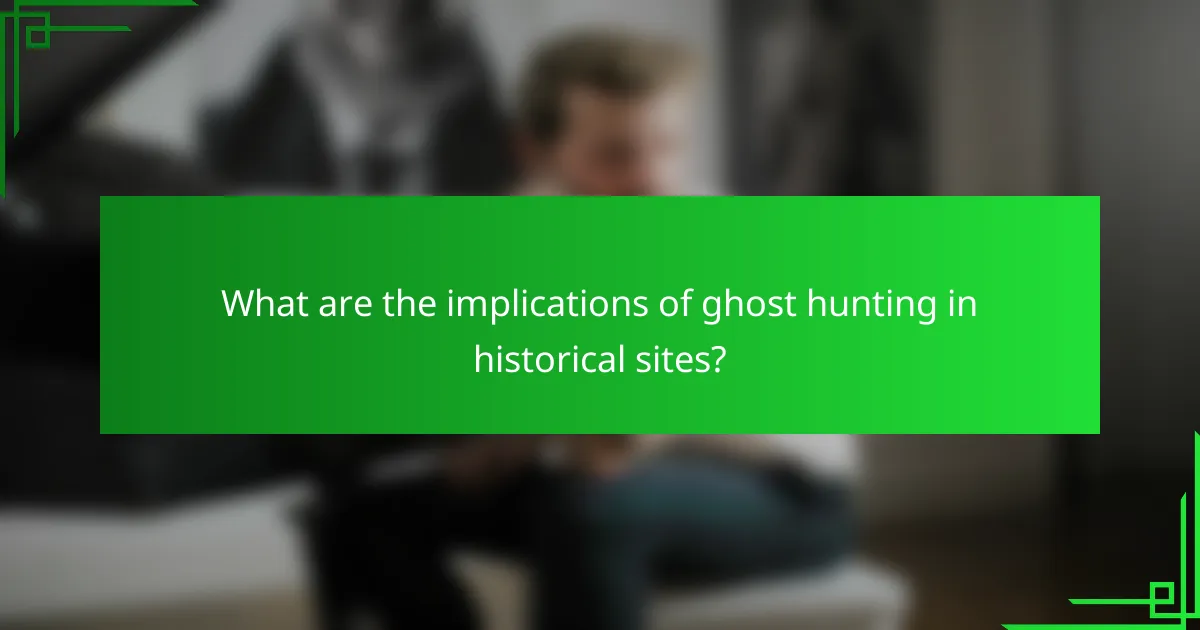
What are the implications of ghost hunting in historical sites?
Ghost hunting in historical sites can raise significant legal and ethical implications, primarily related to preservation and respect for cultural heritage. Engaging in such activities without proper permissions can lead to legal consequences and damage to the site.
Preservation laws
Preservation laws protect historical sites from alterations or damage that could compromise their integrity. These regulations vary by country and often require permits for any activities that may affect the site, including ghost hunting.
In the United States, for example, the National Historic Preservation Act mandates that federal agencies consider the effects of their actions on historic properties. Similar laws exist in many European countries, where local heritage regulations may impose strict guidelines on activities within historical sites.
Before conducting ghost hunts, it is essential to research the specific preservation laws applicable to the site. Always seek necessary permissions and consult with local authorities to avoid legal issues and ensure compliance with preservation standards.
